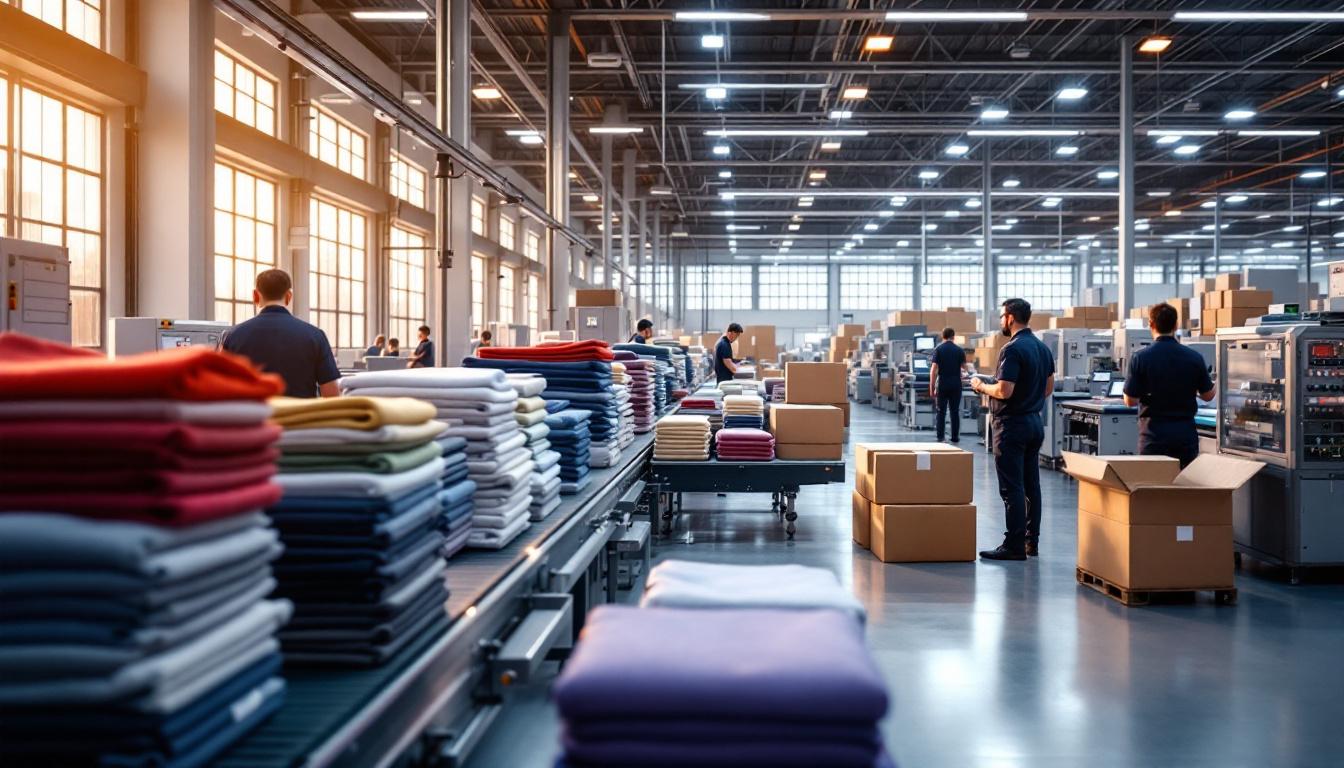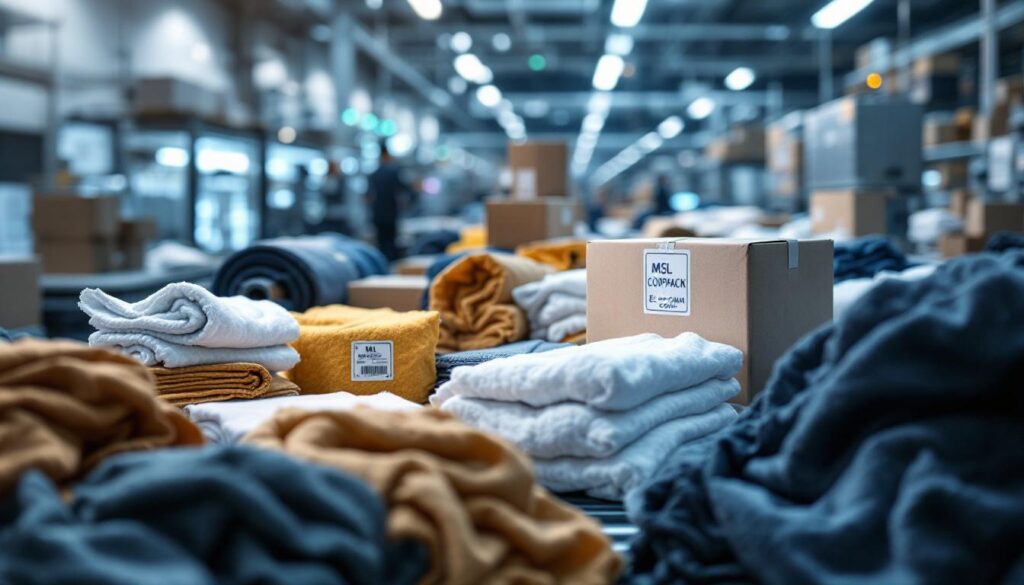
Contract Packaging for Textile: How MSL COPACK + ECOMM Streamlines Packaging and Fulfillment in the Textile Industry
Meeting deadlines, keeping quality high, and shipping products safely are daily challenges for textile businesses. That’s where contract packaging for textile comes in, offering a smarter way to handle packing, storage, and delivery so brands can focus on their core work. With so many moving parts in this industry, companies need partners who work fast, stay flexible, and get every detail right.
MSL COPACK + ECOMM stands out by using new approaches and strong technical skills to tackle textile packaging needs. From advanced wrapping methods to smart inventory management, they focus on helping textile companies move products more efficiently and protect every shipment. In this article, you’ll find out why contract packaging matters, how it supports busy textile brands, and what sets MSL COPACK + ECOMM apart as reliable solutions providers. For those exploring related packing options, check out these Shrink Packaging Services tailored to meet evolving packaging demands.
What is Contract Packaging for Textile?
Contract packaging for textile is a service that handles the complete packing process of fabric goods outside the manufacturer’s doors. Instead of doing everything in-house, textile brands outsource packaging tasks to a specialist. This means a dedicated team packs, seals, labels, and prepares textile products for storage or shipping based on set requirements.
For textile companies, these needs are unique. Different fabrics call for different ways of packing to prevent snags or tears. Products vary, from rolls of fabric to delicately folded clothing. Certain textiles must follow strict compliance rules, especially if they are flame-resistant, medical-grade, or destined for export. With contract packaging, brands get peace of mind knowing every shipment matches quality checkpoints and industry standards.
Outsourcing this work supports efficiency and quality. Textile businesses free up space and staff, turning their focus to design, sales, or other priorities. With expert hands on the packaging, every bundle leaves the warehouse with consistent care, no matter if it’s 100 or 10,000 pieces.
Benefits of Contract Packaging for Textile Businesses
Using contract packaging for textile brings a host of benefits tailored for today’s market:
- Cost-Effectiveness: Paying only for the packaging service beats the overhead of hiring, training, and running an in-house team. Businesses avoid investing in equipment they only need certain times of year. This keeps costs predictable and manageable.
- Scalability: Need to ramp up during back-to-school or holiday seasons? Contract packagers can flex up (or down) fast. You only pay for what you need as your order volume shifts.
- Specialized Technology: Textiles range from delicate silks to rugged work uniforms. Specialized machinery, such as automated folding machines and heat-sealers, are expensive to buy and maintain. Contract packagers already have these and know how to use them for every type of textile.
- Assurance of Quality: Every piece is packed by teams trained for textiles, following firm guidelines. Consistent packaging prevents returns due to damage and boosts brand reputation on store shelves or in e-commerce shipments.
Experienced partners such as MSL COPACK + ECOMM let textile brands focus on what they do best while packaging gets done with precision and speed.
Common Packaging Solutions for Textiles
Textile products require packaging that adapts to their shape, size, and fragility. Here are some of the most common solutions used in contract packaging for textile products:
- Shrink Wrap: A popular choice for keeping stacks of towels, linens, or garments neat and protected. Shrink film conforms to the product, shielding it from dirt or moisture during transport. For businesses seeking in-depth insight into this method, the Definitive Guide to Shrink Packaging Services shows why brands rely on shrink wrapping for both retail appearance and product protection.
- Poly Bags: Clear poly bags are essential for individual clothing items or smaller textiles. They prevent dust, help with organization, and are easy to label for inventory processes.
- Cartons and Boxes: Bulk shipments need sturdy cartons. These boxes ensure products stay flat, stacked, and safe whether they’re headed to a distribution center or a retail store.
- Labeling: Accurate labeling is a must for quick order picking and efficient tracking. Labels often include size, color, SKU numbers, compliance details, or branding.
- Kitting: This means combining multiple pieces (like matching pillowcases and sheets) into one package, ready for sale or promotion. Contract packaging services ensure kitting is done accurately, without mix-ups.
With the variety in textiles, there’s rarely a “one size fits all” answer. The right packaging partner will explain options and customize solutions for each product run, big or small. Proper packaging not only makes textiles easier to move and store, it protects the brand’s promise in every shipment.
Challenges in Textile Industry Packaging and How MSL COPACK + ECOMM Solves Them
Packaging in the textile industry brings a mix of complex hurdles. Products are fragile, prone to snagging or moisture, and need specific handling for each fabric type. Branding often hinges on the first impression—clean, professional packaging is a non-negotiable. Regulations also make things tricky. From keeping products traceable to meeting labeling standards, it’s easy to feel overwhelmed. MSL COPACK + ECOMM steps in with a hands-on, tech-driven approach that addresses each issue head-on, giving textile brands room to breathe.
Maintaining Product Integrity and Compliance
Protecting textile products from dust, moisture, or mishandling keeps customers happy and protects brand reputation. Each fabric—whether it’s delicate silk or rugged denim—demands a unique approach. MSL COPACK + ECOMM uses advanced processes to guarantee every item is packed safely and arrives in perfect condition.
These are the standard practices applied by experienced contract packagers:
- Quality Controls: Professional teams inspect every batch, from incoming raw materials to outgoing packages. Automated sensors, spot checks, and clear guidelines make sure nothing slips through.
- Traceability: Today’s textile brands need to know exactly where each item was packed, by whom, and when. A strong traceability system tracks every piece. This supports quick recalls, better supply chain control, and meets most textile regulations.
- Regulatory Compliance: Textiles often need special labeling—think fire safety information or care instructions. MSL COPACK + ECOMM keeps up with industry rules to avoid compliance headaches, helping brands avoid penalties or delays. They make documentation and labeling a standard (not optional) step with every shipment.
It’s not just about sticking a label on a box. It’s about protecting quality from the first touch to the customer’s doorstep, all while complying with changing textile industry standards. Brands relying on outside space or shared logistics can also benefit from expert warehouse selection. If you’re seeking deeper insight on operations that prioritize packing and quality, check insights on how to choose a warehouse in Indianapolis.
Flexible and Scalable Packaging Operations
The textile business is anything but steady. Demand spikes during holidays, back-to-school seasons, or flash sales. Some months, orders shoot up overnight. The best contract packaging for textile operations don’t just keep up—they stay ahead.
MSL COPACK + ECOMM uses these strategies to stay flexible:
- Technology-Driven Automation: Automated sorting and folding lines handle surges with speed and accuracy. Smart batching means soft goods are packed without delays.
- Expert Labor Management: Trained teams can grow or shrink quickly based on volume. This lets textile brands serve more customers without hiring or laying off staff every season.
- Custom Packaging Solutions: From small poly bags to bulk cartons, they match the right packing method to the fabric and product. This limits waste and controls cost.
This level of flexibility means brands don’t lose sleep over surprise orders or missed deadlines. Their products always look right and arrive on time—no matter the season. If you want more tips on finding storage and distribution that grows along with your business, learning about the best warehouse in Indianapolis can help in planning long-term packaging and fulfillment strategies.
Optimizing Distribution and Fulfillment: The MSL COPACK + ECOMM Advantage
Managing contract packaging for textile is only as strong as its distribution and fulfillment model. MSL COPACK + ECOMM connects packaging and logistics with smart, tailored solutions that meet the needs of the textile industry. By blending sharp e-commerce capabilities with practical warehouse strategies, brands gain speed, accuracy, and control right where it counts.
E-commerce Integration and Value-Added Services
Online orders in the textile world often come with a long checklist. Each shirt, sheet, or roll of fabric must arrive ready for retail, and sometimes that means more than just putting it in a box. MSL COPACK + ECOMM streamlines this process with robust e-commerce integration designed for the textile sector.
Key steps include:
- Custom Labeling: Garments and fabrics are labeled with key details such as size, style, color, and barcodes. This supports quick order picking and smooth inventory tracking, crucial for multi-SKU textile orders.
- Sorting and Kitting: Orders often involve specific groupings, like matching pillowcase and sheet sets, or multi-pack promotional bundles. MSL gets kits right, bundling pieces for direct sales, online promotions, or specialty packaging campaigns.
- Inventory Management: By linking with popular e-commerce platforms, inventory stays up-to-date in real time. Brands see at a glance what’s on hand, what’s moving, and what needs restocking.
- Direct-to-Consumer Readiness: Every package goes out ready for doorstep delivery, not just a distribution center drop-off. Products arrive in retail-ready condition, cutting out middle steps and making unboxing a positive experience.
With these value-added services, brands avoid stockouts, cut shipping mistakes, and build trust with repeat buyers. Instead of juggling emails or manual updates, everything flows smoothly—helping textile businesses compete in a world that demands accuracy and speed.
Strategic Warehouse Location and Logistic Efficiency
Fast deliveries and protected products matter to textile brands on every order, big or small. That’s where warehouse placement and in-warehouse processes come into play. MSL COPACK + ECOMM operates from centrally located facilities with the features textile companies need to succeed.
Here’s why these details make a difference:
- Central Locations Mean Faster Shipping: With warehousing based in logistics hot spots like Indianapolis, brands can reach major U.S. markets quickly. Orders ship out faster, reducing delivery time and customer wait times. Learn more about why a central location supports smarter logistics by checking out the Benefits of Warehousing and Distribution in Indianapolis.
- Climate Control: Fabric goods can suffer from humidity, dust, or extreme temperatures. MSL provides climate-controlled storage to guard textiles from damage, keeping colors bright and textures intact from storage to shipment.
- Optimized Pick and Pack: Orders get filled with speed and accuracy thanks to efficient pick and pack systems. Textile SKUs are organized for quick retrieval, matched to order specifics, and packed for safe, secure delivery.
- Real-Time Visibility: Brands can watch order status and inventory movement from any device, giving managers peace of mind without extra phone calls or manual reports.
These logistics strengths let brands avoid slowdowns and keep costs in check, especially as demand grows. Contract packaging for textile only creates real value when products get to customers looking sharp and on time. Centralized, advanced facilities make that possible—while offering the flexibility textile brands need to adjust as trends or seasons change.
Choosing the Right Contract Packaging Partner for Textiles
Finding the best partner for contract packaging for textile can make or break your operations. The right provider covers much more than packing—it’s about trust, fast communication, smart technology, and a proven track record with textiles. Before signing a contract, you want to ask sharp questions and know what warning signs to avoid so your brand doesn’t fall behind on quality or deadlines.
Questions to Ask Your Contract Packaging Provider
A strong screening process means fewer surprises later. Here are key questions to help you compare partners and see who’s ready for the demands of textiles:
- Do you have experience with textiles?
- Ask about past projects similar to your own. Look for a provider who can handle different fabrics, from bulk rolls to delicate garments, and who understands compliance needs.
- What is your packing capacity and turnaround time?
- Find out how fast orders process during your busiest seasons. Ask for case studies or references showing on-time delivery when volumes spike.
- Which technology do you use for textile packaging?
- Look for automated folding, heat-sealing, barcode labeling, and tracking. Good tech means faster, more accurate handling.
- How do you control quality?
- Ask about batch checks, audits, or automated inspections. Quality control stops defects before they ship out the door.
- Can you customize packaging for different fabrics or promotions?
- Flexibility helps with changing product lines, packaging kitting, or last-minute campaigns.
- How do you integrate with my e-commerce platforms?
- Seamless setup means fewer manual errors. Look for direct connections to Shopify, WooCommerce, or Amazon and ask about real-time inventory updates.
- How do you handle inventory and order tracking?
- You want clear, reliable reporting and the ability to track every SKU from warehouse to doorstep.
- Are you compliant with all applicable textile regulations?
- From labeling to material handling, compliance is non-negotiable in contract packaging for textile. Ask for proof and recent audit results.
- How is customer service handled?
- Fast response and proactive updates keep things on track. Check for dedicated contacts or support channels.
A checklist like this makes it easier to spot strengths and weaknesses when comparing potential partners. For a broader perspective on partner evaluation, reference the Top 10 Qualities To Look For In The Best 3PL In Indianapolis for criteria that overlap with logistics and warehouse support in textiles.
Red Flags to Watch Out For
Cutting corners in partner selection often leads to headaches, missed deadlines, or damaged goods. Watch out for these clear warning signs:
- No textile industry experience: If they don’t have references or samples related to fabrics or garments, proceed with caution.
- Vague or missing answers about capacity: Providers who dodge questions about how much work they can handle or can’t explain their process are risky.
- Old or poorly maintained facilities: Outdated equipment or cluttered spaces invite mistakes, delays, and damage—especially for sensitive fabrics.
- No clear quality control: If they can’t explain how they check orders or stop mistakes, your brand could take the hit.
- Weak integration with e-commerce: Manual order entry, missing tracking, or slow updates spell trouble for online sales.
- Unwilling to customize: If they only offer “one size fits all,” your packaging won’t protect or represent your products well.
- Unclear compliance track record: No paperwork, outdated certifications, or a lack of regulatory knowledge are serious risks.
- Slow or unreliable communication: Good partners keep you in the loop at every stage. If you struggle to get answers before signing, expect worse after.
Watching for these signs helps you catch problems before they become costly mistakes. Whenever you need another perspective on the process of picking the right logistics partner, the 7 Key Factors When Choosing a 3PL Warehouse Location can guide your decision-making for contract packaging for textile and related warehousing needs.
Choose a partner who checks all the boxes and avoids these pitfalls; it keeps your textile business running strong and protects your brand every step of the way.
Conclusion
Specialized contract packaging for textile businesses helps protect product quality, speed up fulfillment, and adapt to changing demand. MSL COPACK + ECOMM stands out for its experience, advanced technology, and fast, flexible delivery. Their services take the stress out of packaging and logistics while keeping every shipment looking sharp and secure.
If you want your brand to stand out and your orders delivered right, it’s time to look at professional contract packaging for textile solutions. For details on how distribution centers can further support your shipping and fulfillment goals, see options at their Distribution center services in Indianapolis.
Thank you for reading—let your business grow with packaging and fulfillment support you can trust. Explore how MSL COPACK + ECOMM can help your textile operations run smoother and smarter.





